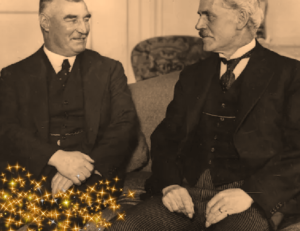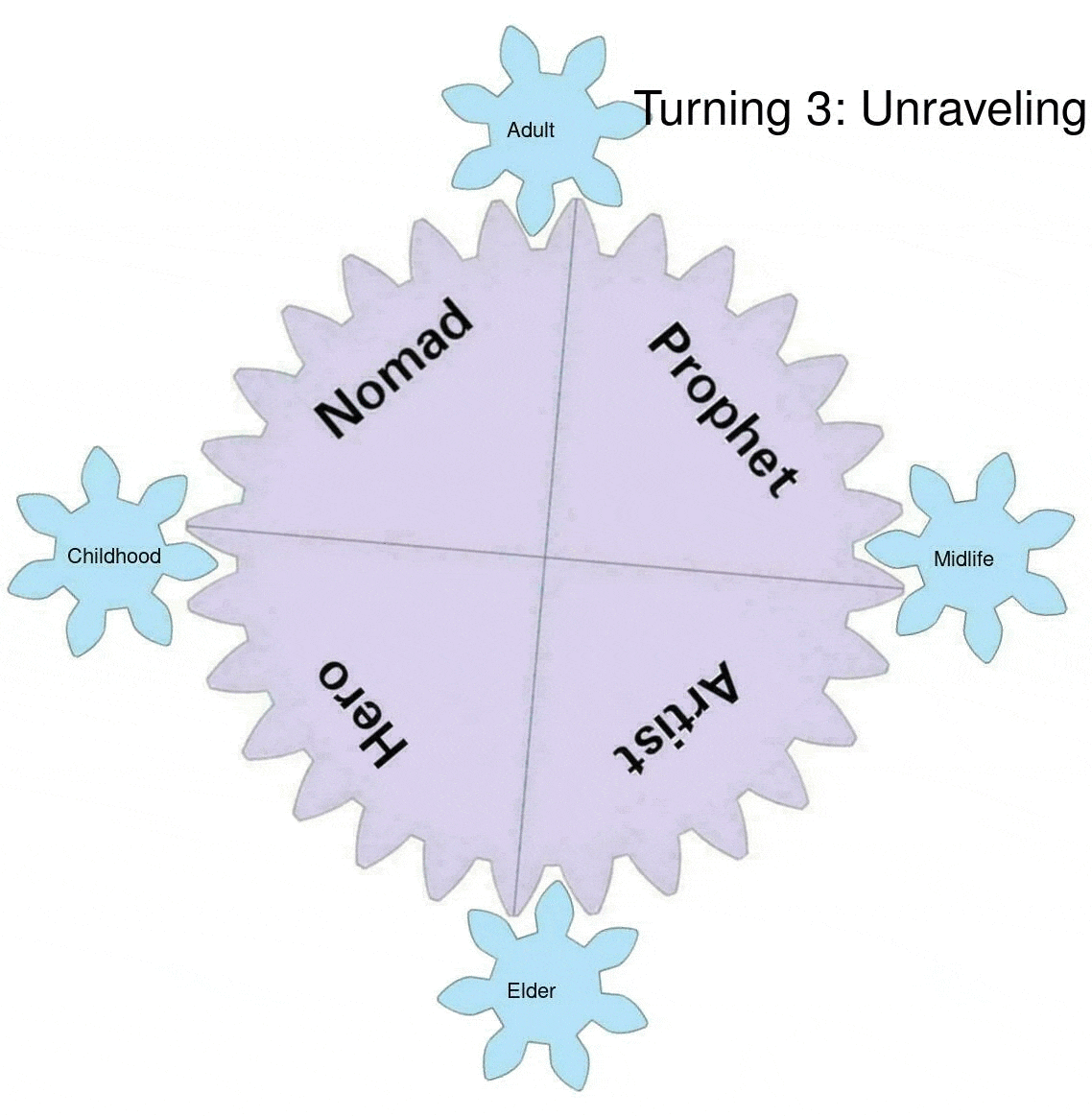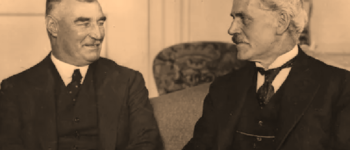1930: Government Making Our Pants Explode
December 24, 2021
By AHNZ
 In 1930 New Zealand’s Prime Minister George Forbes visited Britain and met United Kingdom Prime Minister Ramsay MacDonald (image left.) But only one of these men had a plan unfolding to cause the trousers of their farming community to spontaneously explode. That was our George.
In 1930 New Zealand’s Prime Minister George Forbes visited Britain and met United Kingdom Prime Minister Ramsay MacDonald (image left.) But only one of these men had a plan unfolding to cause the trousers of their farming community to spontaneously explode. That was our George.
John Deem, Director of the Fields Division of the Department of Agriculture in the Forbes Government, had, in this year, 1930, penned an article in the Government’s NZ Journal of Agriculture. The State, in this way, began instructing New Zealand farmers to use sodium chlorate and calcium chlorate as spray-on weed killer. Even at this early stage, Deem pointed out that “Sodium chlorate is supposed to be easily inflammable when dry on clothing. Users are therefore advised to wash any clothes that may become saturated with this material during spraying operations before allowing them to dry…Sodium chlorate, while quite safe to handle, forms explosive mixtures with a number of other substances —for . example, strong acids, sulphur, and sugar. It should therefore always be ‘ used alone ‘.” Ref. Deem (1930)
Eager farmers flooded the Ministry with interest and requests for more information so they could use this killer substance too. Unfortunately, weeds were not the only thing it killed. Explosive little crystals did indeed form on farmer’s trousers and all they needed to detonate was a match or even friction to ignite them. Some men had lucky escapes, some were badly hurt, and some were even burned to death by their flaming trousers.
Why does the Anarchist History of New Zealand leap to blaming these injuries and deaths on the Government? It saves time.
“…Thus Deem noted that, “Representations have been made to the Department of Agriculture that we should import the chlorates and sell to farmers at cost price, but it has been decided that so long as merchants import sufficient and sell it at a reasonable profit over cost the Department will not interfere. Should any attempt be made to impose an undue profit the Department certainly would reconsider the position.” It required a civil servant, an employee of the state, to mount a defense of the free market, and he gave a strong assurance that its freedom would be circumscribed.” – Watson (2004)
“While Mr. Richard Buckley‘s trousers were drying before the fire recently they exploded with a loud report. Although partially stunned by the force of the explosion, he had sufficient presence of mind to seize the garments and hurl them from the house, where they smouldered on the lawn with a series of minor detonations.” – Hawera Star (August 12, 1931); Watson (2004)
“Similar reports came in from other parts of the country. One individual was shocked to observe a newly hung-out load of washing burst into flame on the clothes-line. Numerous farmers and farm workers discovered for the first time that smoking could be hazardous to their health as items of their clothing lit up when they did. In a New Zealand version of “blazing saddles,” one farmer found that the seat of his pants was starting to smoulder as he was riding his horse.”
“There was, however, a tragic side to these events and a number of deaths occurred. Perhaps the saddest instance involved a farm worker returning home after a hard day’s work and going in to see his sleeping baby. As in most farm workers’ cottages at the time, there was no electric light. The father struck a match as he bent over the child, his clothes suddenly ignited, and he died shortly afterward of his injuries.” – Watson (2004)
 In terms of New Zealand’s history clock we were at this time drawing to the close of what AHNZ identifies as the 20-year Great Slump Fourth Turning and the 5-year Friendly Road Victimhood Culture. In a Fourth Turning, a Crisis time, the culture demands aggressive institutions and strong, new, uses for public authority over the public. As James Watson, the Massey University historian who uncovered the exploding trousers story in the first place, observes, New Zealanders during this time looked to The State to tell them what to do. Watson also remarks that Kiwi farmers of 1926 wanted to adopt top-dressing technology but were held back until the 1940s because they wouldn’t make a move without a government permission slip. Likewise, the Victimhood Culture of the times provides double the reason for this attitude. The main means for a Victimhood Culture mainstream (or any individual) to achieve its goals are to seduce or tantrum or finger-wag until someone else provides the desired value. “Not a lot of rugged individualism was evident there, except perhaps in a certain disrespect for authority, the very authority to which the request was directed,” observed Watson.
In terms of New Zealand’s history clock we were at this time drawing to the close of what AHNZ identifies as the 20-year Great Slump Fourth Turning and the 5-year Friendly Road Victimhood Culture. In a Fourth Turning, a Crisis time, the culture demands aggressive institutions and strong, new, uses for public authority over the public. As James Watson, the Massey University historian who uncovered the exploding trousers story in the first place, observes, New Zealanders during this time looked to The State to tell them what to do. Watson also remarks that Kiwi farmers of 1926 wanted to adopt top-dressing technology but were held back until the 1940s because they wouldn’t make a move without a government permission slip. Likewise, the Victimhood Culture of the times provides double the reason for this attitude. The main means for a Victimhood Culture mainstream (or any individual) to achieve its goals are to seduce or tantrum or finger-wag until someone else provides the desired value. “Not a lot of rugged individualism was evident there, except perhaps in a certain disrespect for authority, the very authority to which the request was directed,” observed Watson.
New Zealanders put their trousers in the Government’s hands and, as always, politicians and bureaucrats gladly gathered up that corrupt power unto themselves and rent our tweeds asunder.
Ragwort, it’s about time it was mentioned, was the public enemy all of this trouble was done for the sake of. This weed kills horses and cows and had been a danger for generations. Poisoning due to ragwort in Winton, Southland, had killed large amounts of stock which led to the scourge being called Winton Disease. According to Watson it was New Zealand’s new emphasis on dairy that made matters worse, especially after refrigerated shipping allowed exports. As New Zealand’s fame for butter rose so did ragwort. When we had mixed farming involving sheep the weed was taken care of by our wooly weed-killers. Watson also points out that the Government’s labour market controls in the form of the centralised Arbitration Court prevented the use of paid men to kill the weed. Also, government compulsory schools robbed farms of their children who would otherwise work hard on their family farm and be available for weed control. Stripped of these means, New Zealand farmers were under assault by ragwort and sought a capital-orientated solution in the form of the poison recommended and permitted by Deem’s Department.
As if any further evidence were needed as to why The State was responsible I think I found something else. In 1902 Matata Settlers were up in arms that a large block of non-Maori land was being given to Maoris to cultivate. The Bay of Plenty farmers were concerned that, as so often occurs to this day, the Maoris would greedily take the land but never work it. Instead, they would let it go to wasteland and it would become a “hunting ground.” Ref. MATATA SETTLERS PROTEST MAORI NEIGHBOURS, Auckland Star (1902) One Raueeti P. Mokoiakakgi replied, insisting that “I beg to assure you that the; Ngatirangitihi tribe, whose land was all destroyed by the Tarawera eruption, fully intend to occupy and cultivate the 2000 acres, which have only just been given to them in compliance with a distinct promise made over 15 years ago.” It’s true that the Tarawera Maoris were exploited by the Government then cut loose as refugees in 1886. However, unless I’ve got my land blocks mixed up, it looks like the Settlers fears were realised. In Watson’s article he quotes a detailed science officer report from 1937 observing “…it is difficult to understand that it was ever thought worth developing but since it was, it is very unfortunate that it is now almost abandoned as it is simply a propagating bed for ragwort at present.” It seems that the government’s belated amends for abandoning the Tarawera Tourist Maori by trying to make farmers of them had instead created a man-made ragwort plantation!
The story of the 1930s New Zealand exploding farmer pants has been retold many times since Watson first broke the story. Mythbusters, in 2006, even tried to replicate the situation. In my opinion it wasn’t pants catching fire like paper. I think it was more like a sparkler going off in a cascade which is why I’ve dressed George Forbes up as above. Unlike other sources, AHNZ knows who wore the pants in this situation and that the responsibility belongs to Forbes and Deem. On the other hand, politicians are going to politic and bureaucrats are going to succumb to occupational psychosis. Ultimately New Zealanders are themselves to blame for being seduced by Statism. The cure for that, of course, is Libertarian Anarchism which is what this site is here to provide.
ps. It was up for debate that the exploding government pesticide even killed weeds at all.
This post is available as a podcast. Listen here.
—
Image ref. Our Prime Minister George Forbes with UK Prime Minister Ramsay MacDonald in 1930; Alexander Turnbull Library. AHNZ (sparkles added)
Image ref. John Deem, director of the Fields Division of the Department of Agriculture for 41 years; National Library, Digital NZ
Ref. Control of ragwort and other weeds by spraying; Director, Fields Division, Department of Agriculture; Deem (1930,) New Zealand Journal of Agriculture; Papers Past
Ref. The Significance of Mr. Richard Buckley’s Exploding Trousers: Reflections on an Aspect of Technological Change in New Zealand Dairy Farming between the World Wars, James Watson, Agricultural History (2004)
Ref. Letter of Raueeti P. Mokoiakakgi to NZ Herald (1902); Papers Past
2 thoughts on "1930: Government Making Our Pants Explode"
Leave a Reply
 Like Comment Share
Like Comment Share






That was an interesting snippet of Kiwiana.
Now I’m wondering if that classic Goon Show episode from the 1950s, Tails (?Tales?) of Men’s Shirts, in which Britain attempts to win WW2 by infusing German army uniform shirt tails with an explosive chemical detonated by the heat and pressure of being sat upon was solely the product of Spike Milligan’s surreal mind or was seeded by a long-ago news item from NZ.
Well, possibly. But Milligan does have a core of pants/no-pants based comedy. The 2004 article does mention Blazing Saddles (1974.)